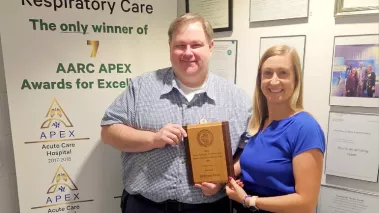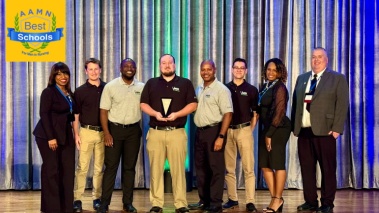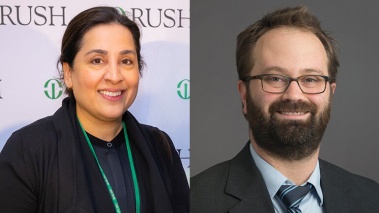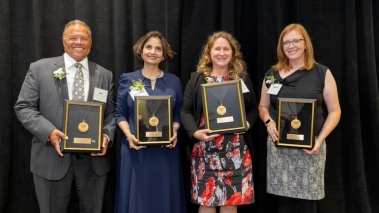Interpreter Services team enables communication with Rush’s diverse patients
Being hospitalized for COVID-19 is frightening for anyone. Not being able to understand what doctors and nurses are telling you makes it even more frightening for both patients who don't speak English and their families.
Since the first weeks that Rush University Medical Center began admitting patients with COVID-19, our Interpreter Services team has been bridging that language gap, helping clinicians communicate with patients and their families in order to provide effective care and explain what's happening. In addition to providing interpretation in Spanish and Polish, the team arranged for interpretation in 63 other languages from March through June (the most in demand were Spanish, Cantonese, Polish, Mandarin, Russian and Arabic).
Prior to the pandemic, Interpreter Services typically received requests for assistance in 10 to 15 languages a month. However, the no-visitor policy the Medical Center had in place until recently meant that family members who spoke English — who often provided interpretation in the past — weren't available, leaving it to Interpreter Services to enable communication.
This need reflects the diversity of Chicago, where 30% of residents speak a language other than English and an estimated 150 different languages are spoken in all. “This is a very multilingual city," says Carlos Olvera, manager of Interpreter Services.
The team met that demand with a combination of staff and vendors and innovative use of technology. “We had to provide our services differently. There was a lot of improvisation," Olvera says.
Interpreter Service's innovative work recently was featured in a report on WGN News.
Video interpreters are available from around the world
At the start of the pandemic, all the interpretation for patients with COVID-19 was done by phone, with a phone put into a plastic bag for infection control and brought into a patient's room. It then was put on speaker with the interpreter and sometimes family members in a conference call. “It was very difficult, because the interpreter would hear a lot of echo," Olvera says.
Quickly, more speakerphones and dual headset phones (one for the patient, one for the provider) were installed in patient rooms on COVID-19 units.
Interpreter Services also worked with Rush’s Information Services team to modify two applications in Epic (Rush’s electronic medical record system) so they could join video calls between clinicians and patient families using the iPads that each interpreter carries. “It's how the nurses and doctors were communicating with families via video to provide updates and for the family to see the patient," Olvera says. “We'll be invited into these calls if they needed an interpreter."
The interpreters have been providing interpretation for scheduled outpatient video visits as well, and in June they began supporting on-demand video visits, too.
They also support in-person outpatient visits. All Rush patients are asked to select a preferred language when receiving care, which is entered in the patient's electronic medical record along with the need for an interpreter. If a patient indicated a preferred language other than English, all of the patient's subsequent appointments at Rush clinics appear on the Interpreter Services list so their office can make arrangements in advance.
In addition to staff interpreters for Spanish and Polish, Interpreter Services utilizes InterpreTalk, a phone interpreting vendor, and Voyce, a vendor that provides video remote interpreting. “You select a language on a touch screen, and the face of an interpreter somewhere in the world comes on the screen," Olvera explains.
They combine this service with Video Remote Interpreter (VRI) units, which are iPads on wheels. “VRI is very helpful to provide on-demand American Sign Language," Olvera says.
'Our doors are open to anybody'
Still, the Rush team handles the vast majority of requests for interpretation themselves. “Our vendors have good interpreters, but our interpreters are some of the best in the nation," Olvera says. “Since they're exposed to a lot of specialties and cases, not just family medicine, they're at a different level of expertise with interpreting."
All interpreters at Rush, including independent contractors, are certified health care interpreters — the highest available credential available to health care interpreters in the United States — or are pursuing the certification, which is required within the first year of working as an interpreter at the Medical Center.
During the first surge of COVID-19 cases this spring, the interpreters frequently worked with nurses staffing a 24/7 center for calls about the disease to respond to calls from anxious members of Chicago's Latino community seeking testing and information. “We would route the calls to the triage nurse and interpret for them" (in a conference call) Olvera says. “We were just getting bombarded with those calls, but we were glad were here to help.
“It goes hand in hand with Rush's commitment to the community. Our doors are open to anybody. It doesn't matter where you're from, we're here to make you better, and language is not going to be a barrier. We'll find a way to communicate and do it humanely and professionally."
Interpreter Services by the numbers
- 13 Spanish interpreters on staff
- Nine independent contractors (six Spanish interpreters and three Polish interpreters)
-
Requests for Interpretation in Fiscal Year 2020:
- Spanish: 203,88
- American Sign Language: 1,179
- Other Languages: 43,678
- Interpretalk: 74,52
- Video Remote Interpretation: 12,352 (10,626 video and 1,726 audio)







